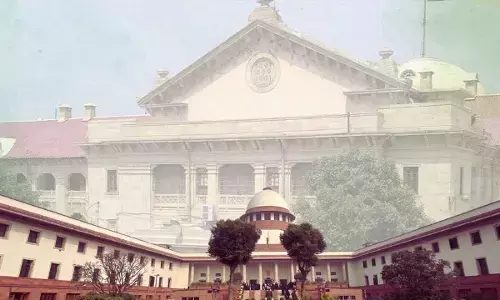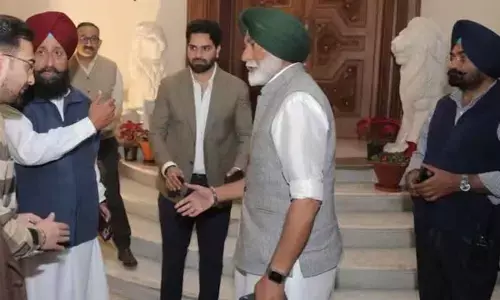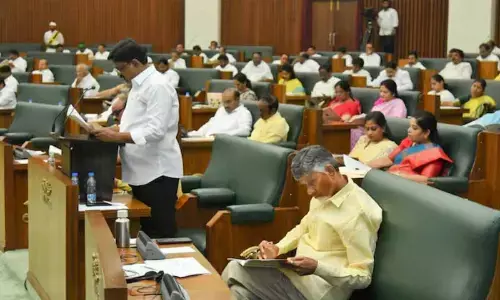Unfair debate on fair wage

Unfair Debate On Fair Wage, Debate on Devayani Khobragade. We live in a country that is, to put it euphemistically, lightly regulated. The entire debate on Devayani Khobragade and her maid in New York is an ample illustration. The problem of paying those who work for us a fair wage is a pervasive one that begins at home and goes global to wherever the Indian Diaspora has decided to spread.
 We live in a country that is, to put it euphemistically, lightly regulated. The entire debate on Devayani Khobragade and her maid in New York is an ample illustration. The problem of paying those who work for us a fair wage is a pervasive one that begins at home and goes global to wherever the Indian Diaspora has decided to spread.
We live in a country that is, to put it euphemistically, lightly regulated. The entire debate on Devayani Khobragade and her maid in New York is an ample illustration. The problem of paying those who work for us a fair wage is a pervasive one that begins at home and goes global to wherever the Indian Diaspora has decided to spread. At home, in an apartment complex where some of the upper class, upper caste professionals like chartered accountants, tax lawyers, and professors live, a princely sum of Rs 3, 000 is being paid to a 24/7 watchman since 1993. A family of four is to survive, send children to school on this amount in the heart of a big city.
Twenty years later, in 2013, the residents repeatedly brush aside all arguments for paying at least legal minimum wage. And invariably the argument of how well everyone treats the watchman and his family and how they are like members of our own family is trotted out without fail.
The sympathy, with which we think about the need to save taxes for our “hard-working” corporate clients, is completely absent when it comes to the minimum survival needs of the poor who work for us. These are upper middle class people who have so much surplus income that they can maintain several households in luxury. The tragedy is, in our country there are individuals who are desperate enough to take any employment available out of sheer lack of alternatives. This reserve army of destitute people is in itself a justification for underpaying them.
Since the 1990s, a new philosophy of employment has taken over the governments. In Andhra Pradesh as elsewhere, governments have desisted from recruiting personnel on permanent basis. Most of the employment is contractual. In one of the high profile ministries, a woman who has a post-graduate degree in Humanities and Law was employed for Rs 3, 500 a month and she was warned at the interview that there are no working hours; she has to report to work before 10 am and stay well past 8 pm if needed. She was recruited for a clerical job after a rigorous test.
Most government departments also began to outsource security jobs. The agencies supplying security personnel are required to bid for the contracts. The lowest bidder is awarded the contracts. Sometimes the lowest bid (L1) itself is at the minimum wage or below. The department that is awarding the contract knows that the agent will deduct commission and there is no way for the contracting agency to pay the legal minimum wage. Many of the government departments routinely indulge in this. Complaints are brushed aside.
Another area of such violations with full knowledge of the government departments is the projects run on Public-Private-Partnership (PPP) mode. The private player’s primary virtue is his ability to under-pay and over-works his employees. The private partner is not held accountable for fair practices in selection of employees and paying a fair wage for work done. They are also free to ignore laws mandating provision of safe working conditions, medical care, toilets and drinking water at worksites. The government allows this even as it periodically accommodates cost escalations.
The state agencies that partner such arrangements believe they are ducking the odium associated with such vilations. This happens with criminal impunity even as both the rent-seekers in the government and the private contractors walk away with crores of rupees in illegal payments/percentages.
The attitude of the Government of India with regard to payment of minimum wage for MNREG workers is also well known.
Even in the case of domestic help being taken to assist personnel employed in diplomatic missions abroad, the Government of India appears to be fully in the know of how these things are being done. The outrage of the government in this case and the active patriotic support media gave appears ridiculous so far.
The Bureau of Diplomatic Security of US Department of State fairly clearly lays out the explanation of immunity in the document, “Diplomatic and consular immunity: Guidance for law enforcement and judicial authorities”. It says, “Diplomatic and consular immunity are not intended to benefit the individual; they are intended to benefit the mission of the foreign government or international organisation.”
It emphasises: “… that even at its highest level, diplomatic immunity does not exempt diplomatic officers from the obligation of conforming with national and local laws and regulations. Diplomatic immunity is not intended to serve as a license for persons to flout the law and purposely avoid liability for their actions. The purpose of these privileges and immunities is not to benefit individuals but to ensure the efficient and effective performance of their official missions on behalf of their governments ….Consular officers may be arrested or detained pending trial only if the offense is a felony and that the arrest is made pursuant to a decision by a competent judicial authority (e.g., a warrant issued by an appropriate court).”
A felony is defined as any crime that invites a year or more of imprisonment. As per the complaint against Devyani Khobragade, the complainant has presented evidence to prove that Ms Khobragade signed an employment contract with the conditions that are required for getting a valid visa for domestic help, but subsequently made the help sign a second contract dropping several of the visa conditions.
This was primarily to insulate herself from any claims arising out of violation of visa conditions. The maid, Sangeetha Richard, also declared in her complaint that Devyani instructed her to lie at the consular interview about the pay and working hours to get the visa. Such a misrepresentation, if proven, can mean a felony inviting over a 10-year prison term.
Being a foreign services official of some twenty years standing, should Devyani have provided false information to get the maid her visa? What national or bilateral diplomatic interest does ensuring cheap domestic labour for Devyani serve?
It is this deliberate misrepresentation that got Devyani in trouble (in addition to the mistreatment and threats alleged by the maid’s family in India). What is shocking in this episode is the way media debates spun it as a matter of national pride. Senior ministers like Shashi Tharoor have staunchly defended Devyani on media debates and questioned US double standards.
There is no solace in claiming that the US also violated these norms on various occasions. This is not a BJP vs Congress television debate, where violation can be matched for violation. The problem of underpaying and routinely violating minimum wage laws under the direct supervision of state agencies that are supposed to ensure the implementation of those laws is disturbing to say the least.
In India we routinely undervalue the contribution of domestic help even as we are so dependent on them. Whichever way this case pans out, the central issue remains that of fair wage. Over the last few years, there have been several cases successfully fought in the US challenging the exploitative practices of non-resident Indians who keep domestic workers in the US.
It is ironic that an Indian worker is dependent on US laws to protect her rights and dignity, while the Government of India actively obfuscates the central issue and sides with the accused diplomat, ignoring the fact that the Indian worker is also a citizen of India.
Next Story








